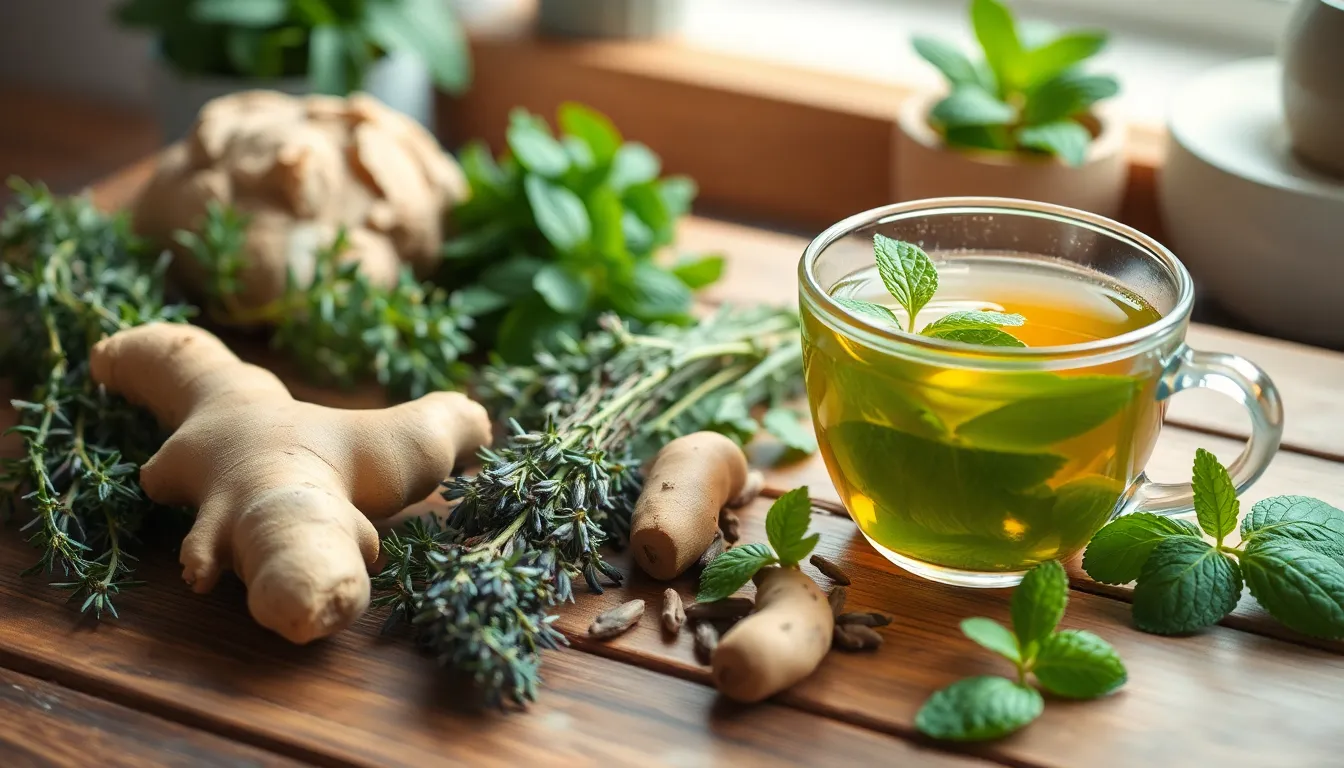When a persistent cough feels like an unwanted guest that just won’t leave, it’s time to explore some herbal remedies for bronchitis. Nature’s pharmacy offers a treasure trove of options that can help soothe those inflamed airways and kick that cough to the curb. Why settle for a box of tissues and a bottle of cough syrup when Mother Nature has your back?
Imagine sipping on a warm, herbal tea that not only tastes great but also helps clear your airways. With the right herbs, you can turn your kitchen into a mini apothecary. From thyme to ginger, these natural wonders pack a punch against bronchitis symptoms. Let’s dive into the world of herbal remedies and discover how they can help you breathe easier while keeping that pesky cough at bay.
Herbal Remedies For Bronchitis
Bronchitis refers to the inflammation of the bronchial tubes, which carry air to and from the lungs. The condition commonly occurs after a respiratory infection. Symptoms include a persistent cough, production of mucus, fatigue, and shortness of breath. It manifests in two forms: acute and chronic. Acute bronchitis often develops from a cold and lasts for a short duration. Chronic bronchitis, a long-term condition, typically results from repeated irritation or damage to the lungs.
Inflammation causes narrow airways, which leads to difficulty breathing and increased coughing. Irritants such as tobacco smoke, air pollution, and dust may trigger bronchitis episodes. Identifying these triggers helps in managing the condition effectively. Certain individuals, especially those with weakened immune systems or pre-existing lung conditions, are more susceptible to bronchitis.
Treatment options usually focus on relieving symptoms. Conventional medications offer immediate relief but can have undesirable side effects. Thus, herbal remedies emerge as appealing alternatives. Natural options, like thyme and ginger, demonstrate potential in soothing inflamed airways and reducing mucus production.
Lifestyle modifications, including quitting smoking and staying hydrated, can support recovery. Resting and avoiding irritants make a significant difference in healing time. Considering these strategies ensures a comprehensive approach to managing bronchitis effectively.
Awareness of bronchitis and its symptoms is crucial for proper management and effective use of herbal remedies. Understanding the condition enables individuals to take proactive steps toward better respiratory health.
Effective Use Of Herbal Remedies

Herbal remedies offer natural alternatives for alleviating bronchitis symptoms. Various herbs provide relief and can improve overall respiratory health.
Common Herbal Treatments
Thyme functions as an effective remedy due to its antimicrobial properties. This herb supports airway relaxation and helps expel mucus. Ginger acts as a potent anti-inflammatory that eases bronchial irritation. It can promote circulation and clear congestion, enabling better breathing. Peppermint contains menthol, which soothes throat discomfort and enhances airflow. Using these herbs in teas or tinctures can maximize their benefits, making them accessible for daily use.
Benefits of Herbal Remedies
Herbal remedies present several advantages over conventional medications. These natural treatments often have fewer side effects, making them safer for long-term use. They can enhance immune function, promoting quicker recovery from bronchitis episodes. Many herbs provide additional nutrients, supporting overall health and vitality. Cost-effectiveness is another factor, as herbal solutions tend to be less expensive than pharmaceuticals. Individuals can make informed choices through research and consultation with healthcare providers, ensuring optimal use of herbal remedies for bronchitis management.
How to Use Herbal Remedies
Herbal remedies offer a practical approach for managing bronchitis symptoms. Utilizing various preparation methods ensures maximum benefit from the herbs.
Preparation Methods
Infusions and decoctions are common methods for preparing herbal remedies. An infusion occurs when one steeps herbs in hot water, capturing active compounds. For example, steeping thyme leaves in boiling water for 10 minutes creates a soothing tea. A decoction involves simmering tougher parts, such as roots or bark, for about 20 minutes. Ginger slices work well in a decoction for enhanced flavor and medicinal properties. Additionally, herbal tinctures provide concentrated extracts. Creating a tincture requires steeping herbs in alcohol or vinegar for several weeks, resulting in a potent solution. All options allow easy incorporation of herbs into daily routines.
Dosage Recommendations
Dosage varies based on individual needs and specific herb strength. For thyme tea, consuming 1 to 2 cups daily supports respiratory health. Ginger can be taken as a tea or supplement, with a general recommendation of 1 to 2 grams daily. Peppermint tea offers a refreshing option, with 1 to 3 cups advisable. Individuals should start with lower doses to monitor reactions. Consulting a healthcare provider helps determine appropriate dosages tailored to personal health conditions. Overall, consistency in herbal use enhances their benefits for bronchitis symptoms.
Precautions and Considerations
Herbal remedies can significantly help manage bronchitis symptoms, but caution is essential. Individuals should consult a healthcare provider before starting any herbal regimen. Allergies to certain herbs may exist, so knowing personal sensitivities is crucial.
Not all herbs interact safely with medications. For instance, thyme might affect blood-thinning medications. Ginger can elevate blood sugar levels, making it necessary for those with diabetes to monitor their levels closely.
Dosage requirements vary across individuals. Starting with lower doses is advisable to assess tolerance. Gradually increasing the amount allows for evaluating the herb’s effectiveness without overwhelming the system.
Pregnant or breastfeeding women must exercise additional caution. Certain herbs may not be safe during pregnancy or lactation. Always check with a healthcare provider to ensure safety for both mother and child.
Chronic bronchitis requires extra attention. Those with existing respiratory conditions may need tailored advice. Regular monitoring of symptoms ensures that herbal remedies provide the desired relief without adverse effects.
Symptoms worsening after starting an herbal remedy should prompt immediate medical attention. It’s important to discontinue use and seek professional guidance if complications arise. Overall health conditions and existing medications must guide any herbal treatment approach.
Conclusion
Exploring herbal remedies for bronchitis offers a natural approach to managing symptoms and enhancing overall well-being. By incorporating herbs like thyme ginger and peppermint into daily routines individuals can find relief from discomfort while minimizing side effects associated with conventional medications.
It’s essential to prioritize safety by consulting a healthcare provider before starting any new herbal regimen. This ensures that any potential interactions or allergies are addressed. With consistent use and mindful practices individuals can harness the benefits of these natural remedies to support their respiratory health and improve their quality of life.

